
The rollout of EQUIP® to the John Deere equipment dealers in the US was proceeding at an exhilarating pace. In 2004, we attended the annual John Deere User Group conference in Saint Louis, Missouri, (below) and were impressed by the sophistication of the displays and the enthusiasm of the attendees.
John Deere dealers and their staff attended in their hundreds, demonstrably proud of their loyalty to the company and its products. But above all, for us, the EQUIP® brand was front and centre. Our future in the United States and Canada seemed assured.
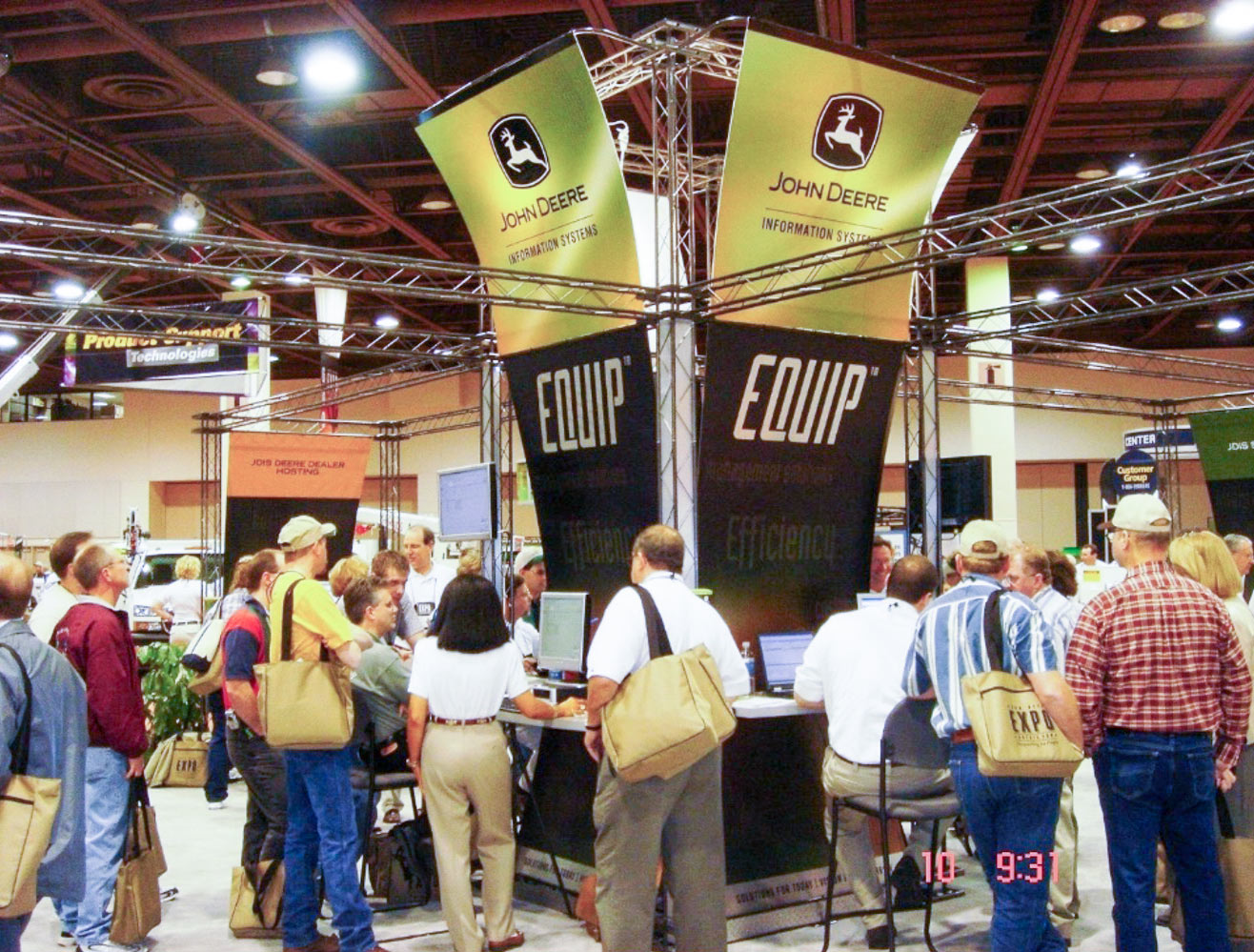
South Africa
In 2007 Rohan Duncan and I made the first of several visits to South Africa. We’d been invited there by Adriaan Du Randt, a dealer management system provider in Johannesburg. Adriaan was looking to find a modern DMS to replace the legacy system he was currently selling.
Johannesburg is a beautiful part of South Africa, but with a dangerous edge.
Since Mandella’s inauguration the white population has remained static, and ethnic Asian and Muslim populations have markedly decreased. In contrast the black population has increased by 20 million, a number well beyond the country’s ability to assimilate. This explosion was caused by a constant stream of northern neighbors breaching the fence in search of a better life. Nowadays, black residents can roam freely, but this freedom doesn’t bring jobs. Paradoxically white people have jobs, but it isn’t safe for them to live outside gated compounds.
We’d been warned not to risk public transport, and Adriaan picked us up from the airport. At every traffic light on the way to Centurian where Adriaan lived, there were small knots of locals desperately trying to trade with cars waiting at the lights. Unfortunately, if you stopped, your chance of being harassed or violently carjacked increased. So, cars slowed down well in advance if the lights were amber or red, and floored the accelerator when they turned green.
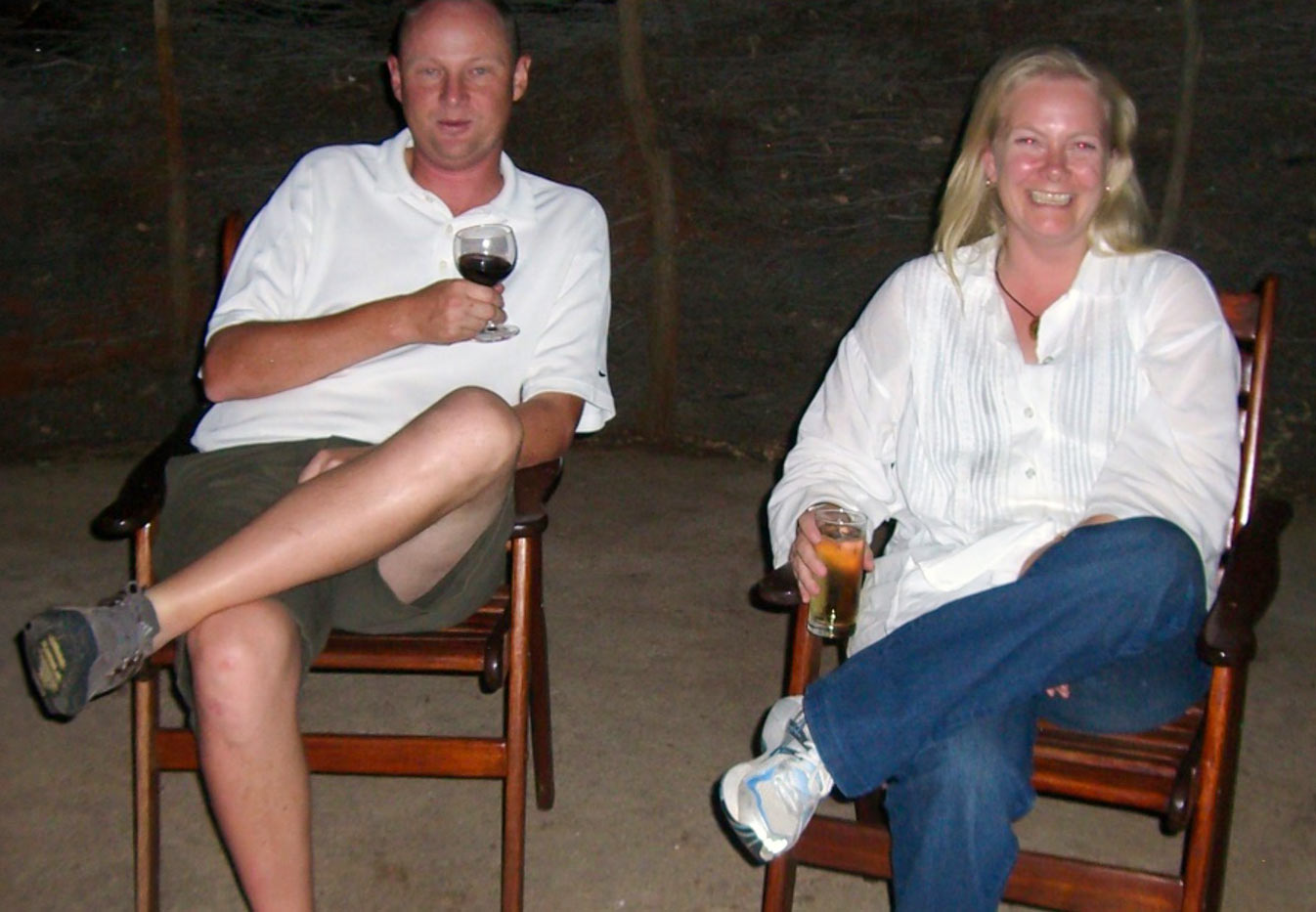
Rohan Duncan and Jodie Pitt, two senior Auto-IT staff, after a hard day’s work in Johannesburg, Feb 2008.
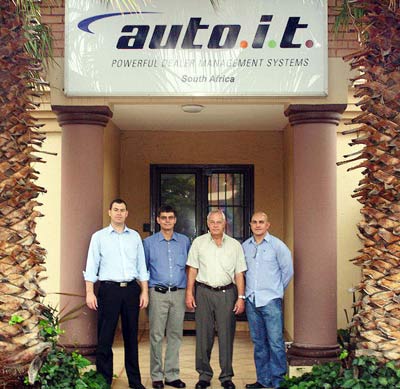 The compound where Adriaan and his family resided contained a beautiful golf course and hundreds of modern, well-appointed houses.
The compound where Adriaan and his family resided contained a beautiful golf course and hundreds of modern, well-appointed houses.
An oasis of tranquility kept safe by security patrols and razor wire. In the early mornings young African men clustered around the entrance gate hoping to be selected for caddy duty. The unsuccessful drifted away around midday.
Adriaan was a generous and entertaining host. During our visit we forged a business relationship with his company – AKNT Technologies which exists to the present day.
Our UNITS® and EQUIP® software, thanks to Adriaan’s staff, is now running businesses in 13 African nations.
Pictured: AKNT Technologies Johannesburg. From left Willem DuRandt, Theuns Beukes, Adriaan du Randt, Pierre Coetzer.
USA
Later that year I pondered over how we could obtain an endorsement from John Deere, to assist us to sell into their international markets. My problem was one of credibility. How could John Deere, a USD $25 billion a year company, be encouraged to stand behind Auto-IT, an AUD $9.2 million company? I would need to convince a senior executive of the benefits.
We had some good friends within Deere who provided me with the name and title of the Director I would need to convince. My plan was to ask for a face-to-face meeting. I sent off my request, it was accepted, the time and date were fixed, and the die was cast.
John Deere’s head office is in Moline, Illinois. Moline is a grueling 27-hour journey from Melbourne. I wore a suit during the flights, changed into a fresh business shirt after landing in Moline, then caught a cab to meet up with John Campbell and Bruce Dalfonso, my two sponsors from JDIS. Together we were ushered into the Director’s office where we sat nervously for a few moments until he entered and sat at his desk.
He didn’t offer a handshake, there was no smile of welcome or comments on my long journey, in fact there was no small talk at all. I introduced myself and explained briefly why it was in both our companies’ interest to work together to introduce EQUIP® into Deere dealerships outside the US. I handed him a one-page synopsis of my proposition.
He scanned it then said to John and Bruce, “Have you read this?” They nodded. He said to me, “What do you want me to do?” I said, “If you agree there are advantages in collaboration, a team from Moline and one from Melbourne should meet in a neutral venue to brainstorm a practical way forward. Hawaii would be a good venue.” He looked up again and said to John and Bruce, “Do you agree?” They both nodded. He stood up and said, “Then I’ll leave the arrangements to you two. Make sure you keep me in the picture.” And with a nod to me he disappeared through the door.
John turned to me and said, “You probably don’t realise what we’ve just achieved,” and at the time I probably didn’t, but that 20-minute meeting proved to be the key that opened the welcome door to us in all Deere’s important international offices.
The two-day conference in Hawaii went ahead and at the end of it, Bruce Dalfonso was assigned to travel with us with the title, Manager EQUIP® Marketing. He was now Deere’s elected representative to broker introductions to decision makers throughout Deere’s international network.
Mexico
Our first venture under the new arrangement was an exploratory trip in November 2007 to John Deere’s head office in Mexico. This was Monterey, a border town in Northeast Mexico and a hot spot for cartel rivalry.
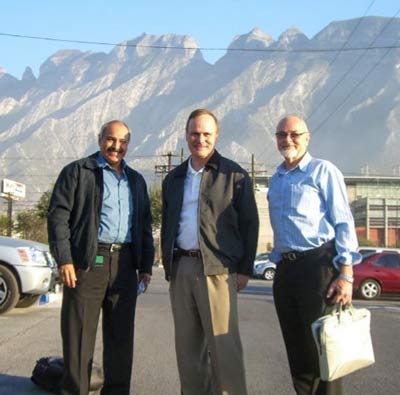
From left, John Deere Mexico Computer Services Manager, Mario Garcia, Bill Jones, Director JDIS, and me.
Frank came with me, and we were accompanied by Bruce, and Bill Jones, the newly appointed Director of John Deere Information Systems. We spent several days scoping out the needs of the Mexican dealers and Frank, being a native Italian speaker, was conversing with the local dealers in workable Spanish in no time.
Monterey is a truly beautiful city with cleverly designed parks and gardens, and a backdrop of impressively rugged mountains. Unfortunately, the drug trade is on steroids and when we were there, armed personnel carriers sped through the streets on endless urgent missions, and police with assault rifles were never far from sight.
We followed local advice, restricted ourselves to safe areas, and when we left were able to report our sales efforts in Mexico had been successful. As a result, today, almost all Deere’s dealerships in that country are running their businesses on an EQUIP® software platform.
Frank visited Monterey a year or so later to find that violence in the area had escalated and the CBD had been taken over by competing gangs. He was forced to find safe accommodation in a quiet suburb across the Santa Caterina River, and because public transport was now unsafe, he was met at the airport and delivered there by a local John Deere representative. On that trip he was also accompanied by three Deere people from Moline as they needed to consult as a team with a key dealer in Chihuahua. This was deemed in the US to be a dangerous journey, and all their movements were monitored from Deere’s security department in Chicago.
The 2010 wave of violence in Monterey broke out again in 2023. Another war erupted recently, and seven corpses and five bags of body parts were distributed around the city as a graphic warning to new hopeful drug lords.
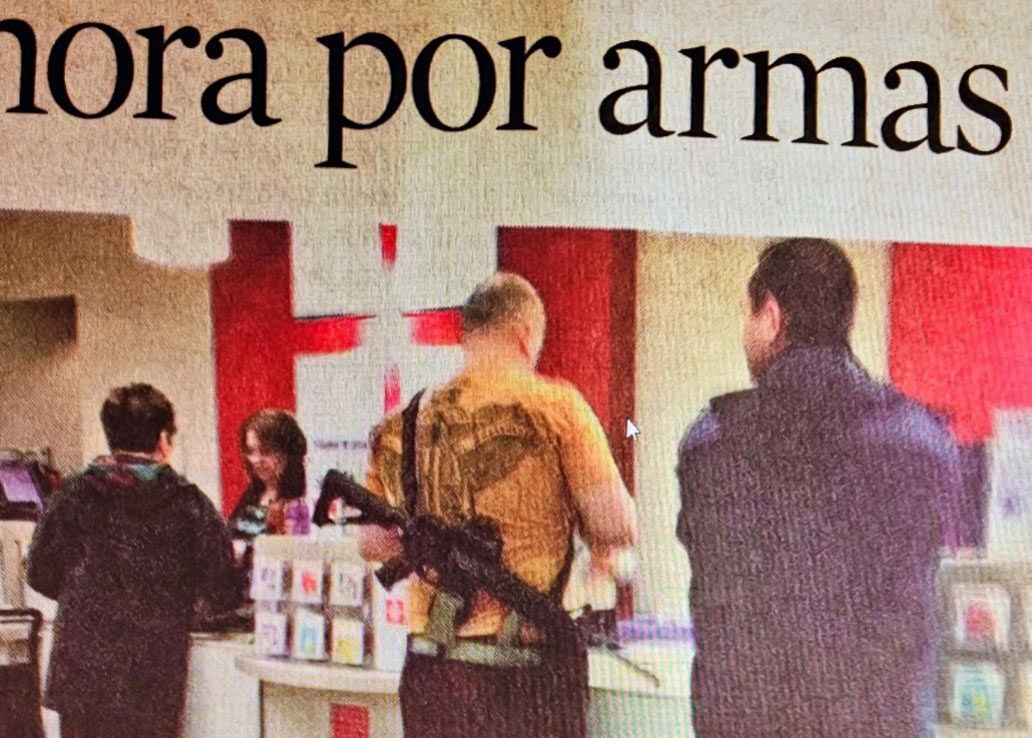
Out shopping in a Monterey supermarket. Frank took a photo of this newspaper article during his last visit.
Hawaii
In May 2008 we held another meeting in Hawaii, this time to negotiate the terms for the purchase by Deere of the EQUIP® source code for North America. The result was announced to the world in the statement below.
Press Release Dec 2008
US $6 million Export Deal for Auto-IT. John Deere Information Systems now owns the source code of EQUIP® in North America, but only for the Agriculture and Construction Industry. Auto-IT retains the right to sell its software systems to non-agricultural, forestry and construction dealerships in North America, as well as to all markets internationally.
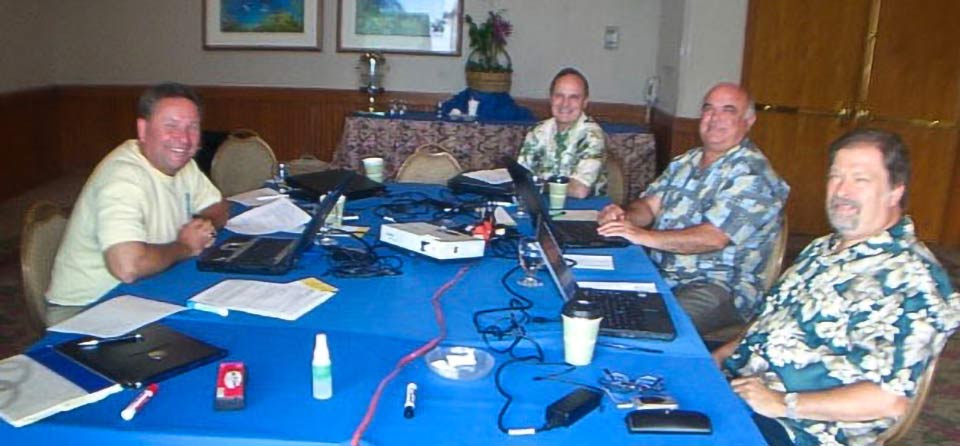
Russia
In 2009, we conducted presentations in Manheim Germany, Deere’s regional head office for East and West Europe. We failed to excite much interest from German dealer system providers, and fared little better with a Polish contingent. But interest from the Russians was promising. At our conference we were introduced to Dmitry Kazachkov and invited to meet with him in Moscow. Dmitry was CEO of 1C-Rarus an IT company recommended by Deere as a suitable Russian partner for us.
Our contingent for the first visit to Moscow was made up of seven people. Frank and me, Bruce Dalfonso, and four John Deere Europe dealer development people. Accommodation had been organized for us at the Korston Hotel, which was comfortable and rather grand in a flamboyant way.
We were later to learn that President Putin had recently shut down the Moscow gambling venues and the Korston Casino had been decommissioned. Putin’s proclamation didn’t extend to houses of ill repute though, because it didn’t take us long to realise the Korston Hotel also had a busy sideline as a working brothel, and the gorgeous young women walking down the stairs, and hitchhiking their way back to Moscow, were working girls coming off their shifts.
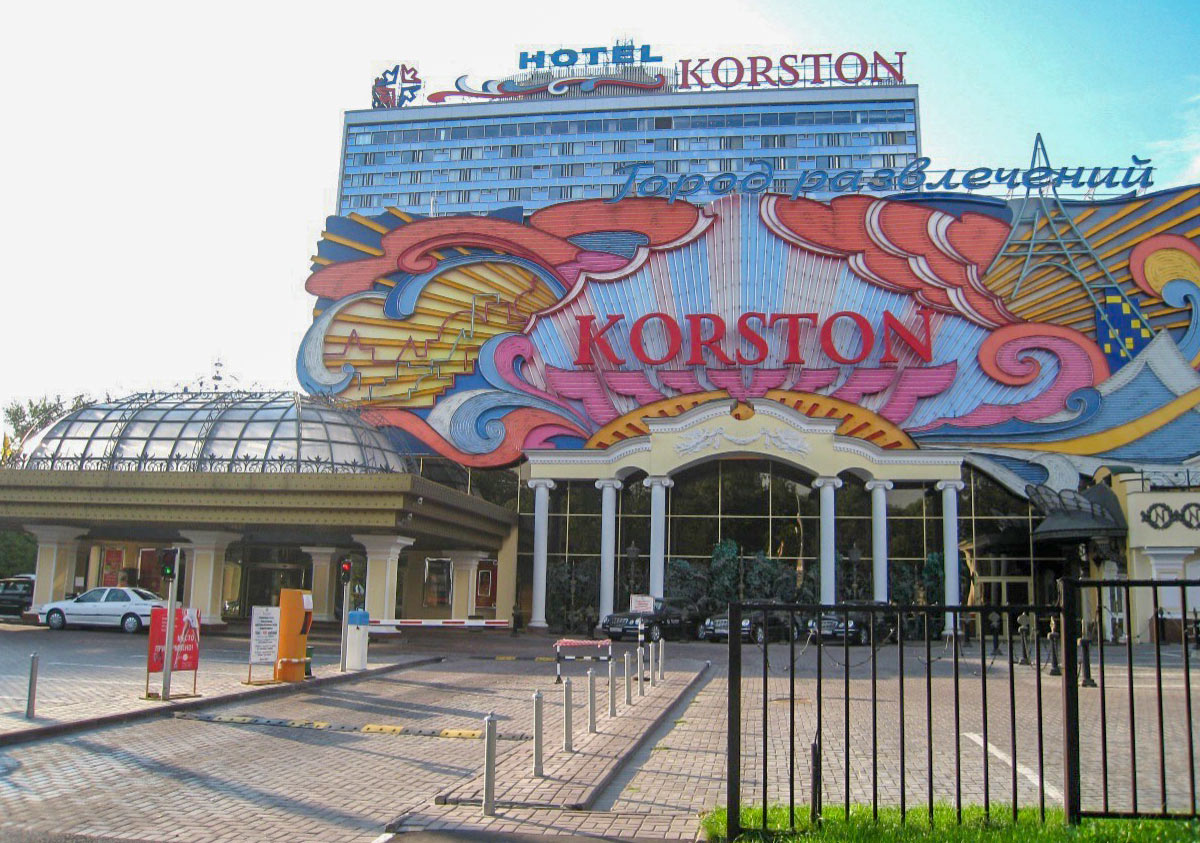
Korston Hotel
On our first day we demonstrated EQUIP® at a well-attended gathering of John Deere dealers, principally made up of large confident men exuding a healthy measure of skepticism. The day was entertaining, and we weren’t unhappy when it was over, but I knew they’d be a hard lot to negotiate with.
The next day, I had a meeting with the CEO of 1-C Rarus to work through the clauses in our agency agreements, while Frank and the Deere people met to discuss localization needs. Frank later reported that the changes we had to make were more significant than expected. He’d been informed in Australia that the international accounting standards underpinning EQUIP® were now officially acceptable in Russia, but the dealers weren’t interested.
In real life they said, new accounting rules would provide an opportunity for government officials to enter their premises on the pretext of auditing. This would give them the opportunity to lock the computer systems, until significant bribes were paid.
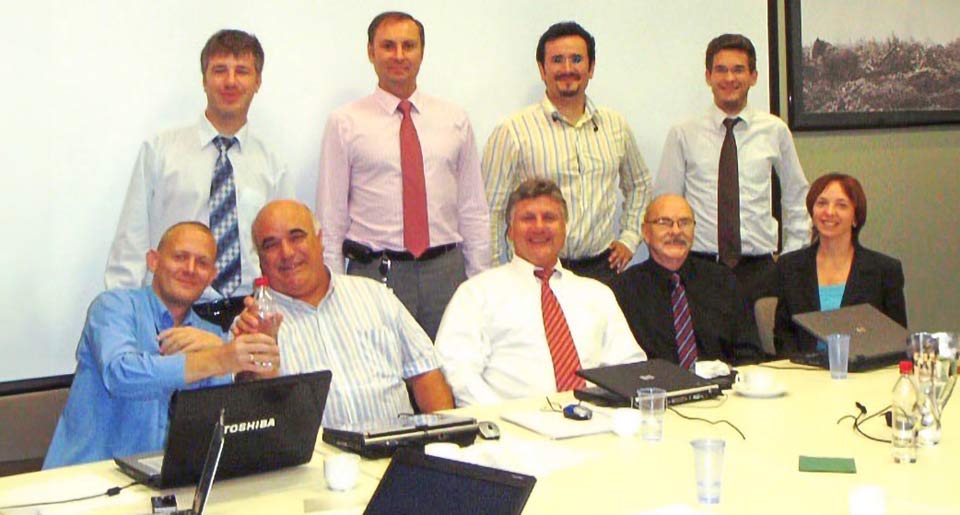
Frank and me with John Deere dealer development managers from Germany, Poland, Ukraine and Russia – prior to presenting EQUIP® to the Russian Dealers.
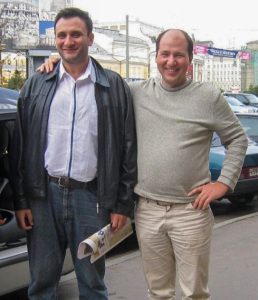 To avoid these problems, we had to re-code our software to feed the results of every transaction into 1-C, the existing state approved system.
To avoid these problems, we had to re-code our software to feed the results of every transaction into 1-C, the existing state approved system.
While Frank was meeting with the dealers, I visited 1-C Rarus to meet with the CEO, Dmitry Kazachko, pictured on the left, with his right-hand man, Evgeniy Dockuchaev.
The office was hot and airless, the rooms featureless, and the desks tightly packed together. Dmitry was a substantial shareholder of both 1-C and his own company Rarus. This meant he was politically well connected, and I was informed, significantly wealthy. The purpose of our meeting was to discuss the terms for Rarus to become our exclusive agents for the sales implementation and support of UNITS® & EQUIP® in Russia.
Our discussions were concluded satisfactorily with a handshake after two afternoon sessions and the contract was ready for our solicitors’ approval. Auto-IT would need to concede a little on some minor points and Dmitry had asked to extend his exclusive agency rights into three other nations in the previous USSR territory.
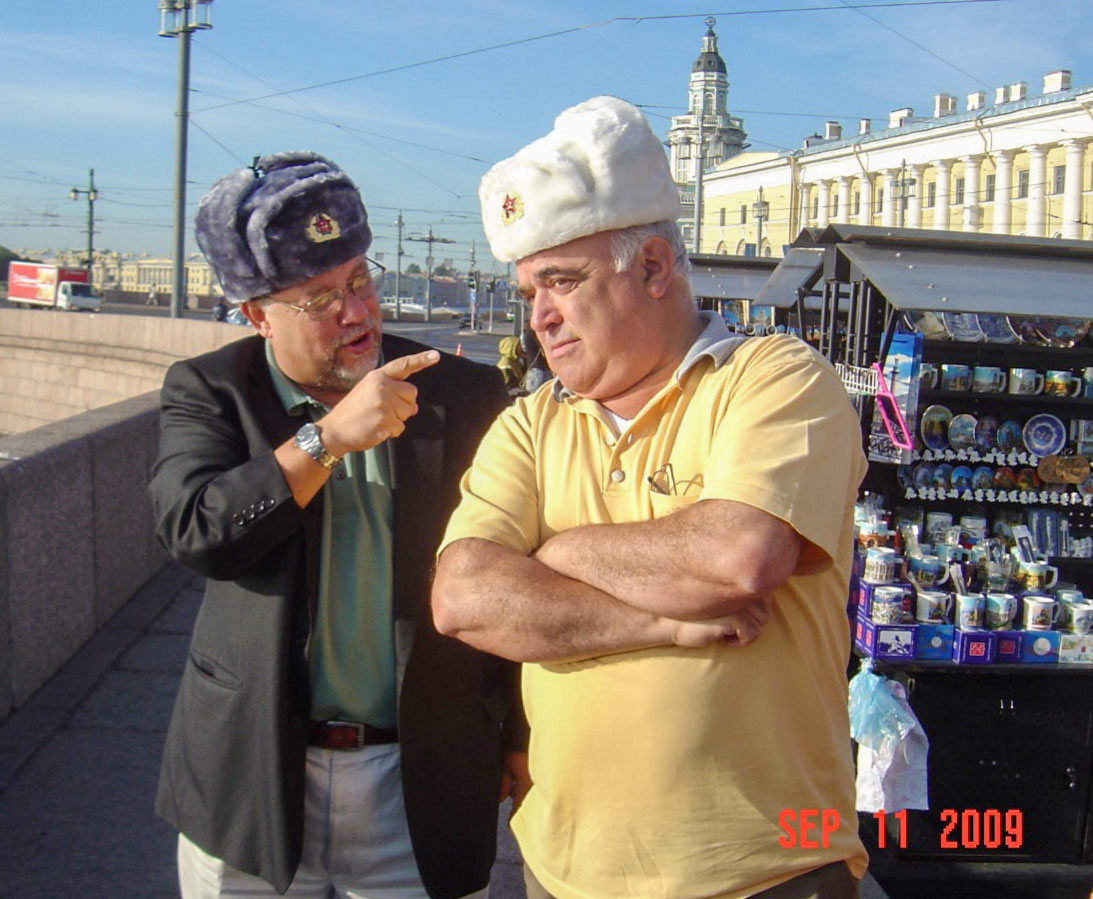
Frank and Bruce hamming it up after work at a Moscow market.
On Friday morning Dmitriy said “If you agree, I’ve made interesting plans for your weekend. Be at the Moscow Central Station at 6pm, I’ve booked you on the overnight train to St Petersburg.
This generous decision covered our party of 5 plus his right-hand man, Yevgeniy Dockuchaev. We were booked into first-class carriages with two single beds.
On arrival we were met by a young lady with fluent English who showed us all the sights of this historic city over two full days. On Sunday night we took the same train back to Moscow and in the morning, we were met at the station and transported for breakfast at the Metropol Hotel in the center of Moscow. This is a very grand building, dating back to pre-revolution days. The Metropol was made famous in modern times by the best-selling book, A Gentleman in Moscow, by Amor Towells, and also recently in a series streamed on Netflix.
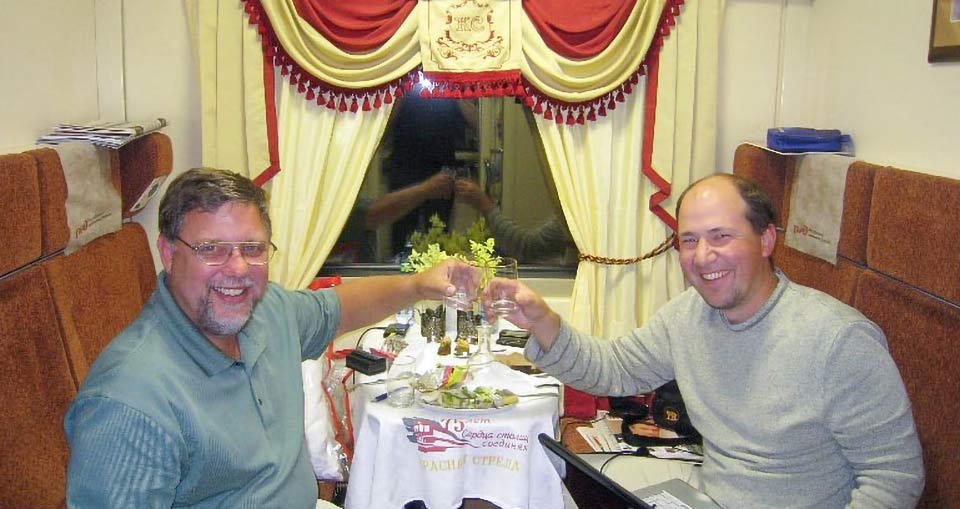
Bruce and Evgeniy on the overnight train to St Petersburg.
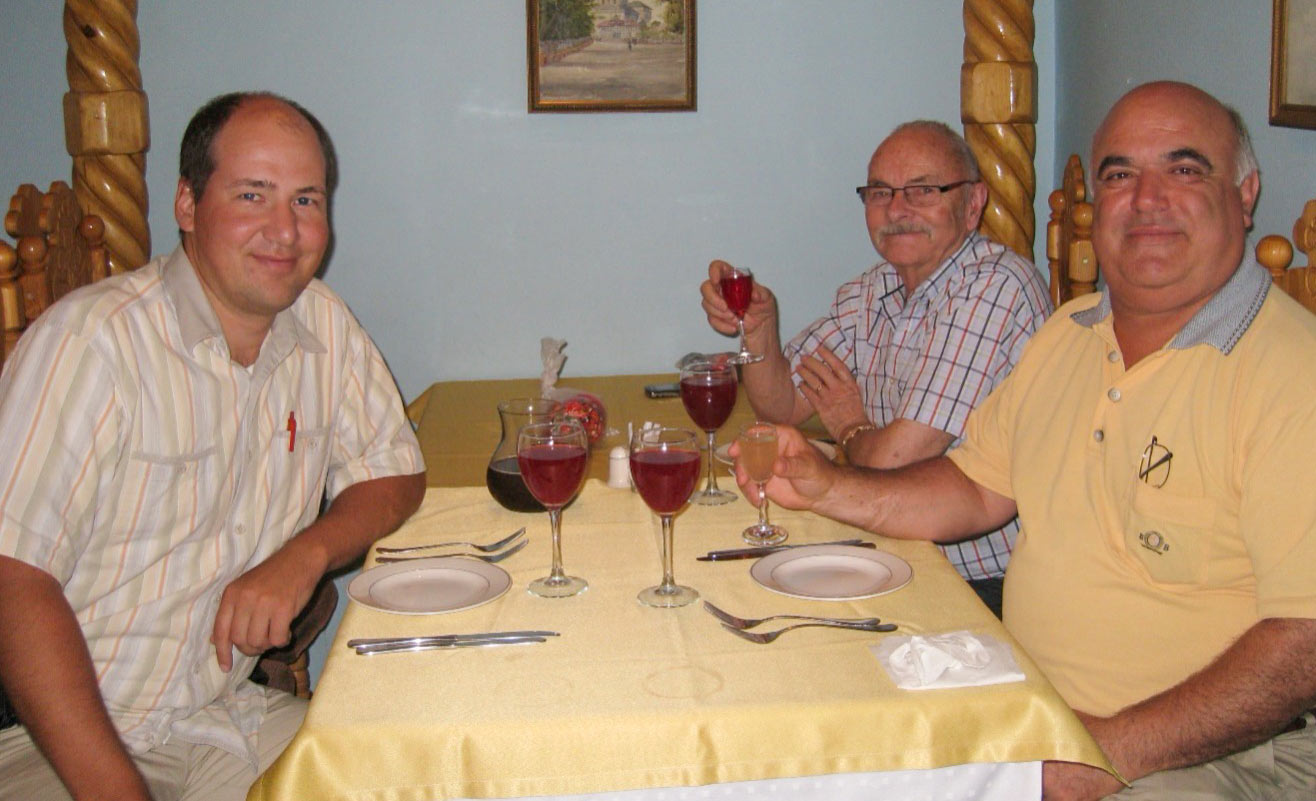
Breakfast at the Metropol.
When breakfast was over a van was waiting to take Frank and me to the airport and home. It was driven by Yevgeniy’s brother who kindly gave us each a gift of an old USSR bank note as a going away present.
So once again we’d been treated exceedingly generously in a way that eclipsed even the magnanimity we’d been shown in Kuwait. Our success in Russia was assured.
Two months later in November, Rohan and I flew into Moscow again. There was no air bridge, so we disembarked and walked across the tarmac to the arrivals hall. The locals were dressed against the cold, but we hadn’t been forewarned and the freezing blast after the warm cabin was excruciating.
Inside there were no crowd barriers, and a heaving scrum of people were clamoring to get past customs. We eventually made it and were escorted to Korston once again. Our mission was to demonstrate UNITS® to Ekoniva, the Toyota car dealership that Rarus had selected to be our first live trial site.
When the weekend came, Dmitry’s generosity came to the fore once again, and a professional guide was waiting in the lobby to escort us on a full day tour around the many historic sites in Moscow.
Early in the new year the assigned Rarus team came to Australia for a two week training course and to work with us to set up the structure of workflow for the localization of the software. I offered to organize comfortable accommodation in the city close to our offices but was told that Rarus had taken care of it themselves. When they arrived, we transported them to their digs, which proved to be in a cheap motel with two bedrooms, well out of the city. There were four men, and one young lady called Maria. I asked her if she was okay sharing rooms with the men and she didn’t seem phased. I suspect cost was significantly more important than privacy.
After checking in, and despite the late hour, they all set off for their first view of Australia. They walked along a rural road towards Hoppers Crossing and spent an hour or so in a service station café before returning to their motel – and disaster. Somebody in the know had lifted the sliding door to the terrace off its tracks, entered their room, and ransacked their luggage. Anything of value was stolen including cameras, clothing and all their computers. The computers were pivotal to their work and finding replacements keyboards with Russian characters in Melbourne took some doing. The staff and the police were polite enough, but the motel showed no interest in accepting responsibility for the terrace door which could be so easily removed from the outside.
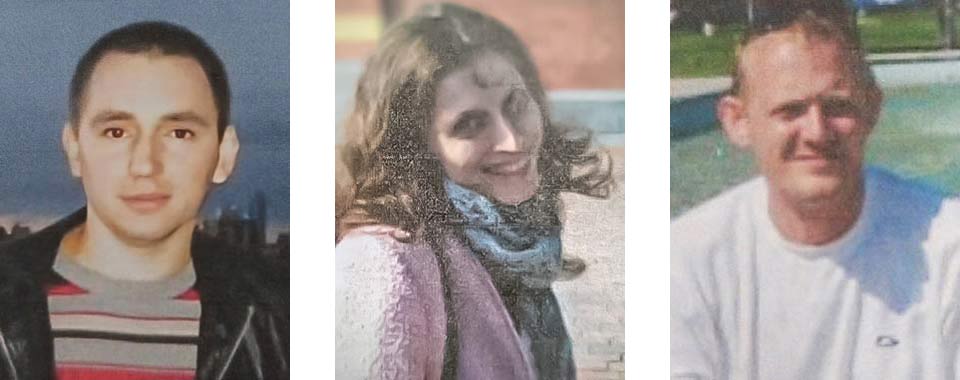
Three of the five person Russian technical team: From L-R, Nicholay Kiryanov, Maria Chernysheva, Sergey Dolgov.
The Russian team, when they settled in, were smart and engaging, and when the time came for them to return to Moscow, both teams had an agreed conversion plan with defined timelines and deliverables. We’d also set hard dates for progress meetings because it was important to meet the scheduled target date for live running.
We got to work with enthusiasm, but the Russians never seemed to be able to reach their promised targets. At each meeting they were further behind until it became evident, we had no hope of meeting the live running targets. These were capable well-trained professionals, the only conclusion I could draw was that they were being diverted onto other more pressing projects.
I was taught in my sales training days that you can’t hatch China Eggs. I estimate the cost to Auto-IT of trying to enter the Russia market was now in excess of half a million Australian dollars, but without commitment from Rarus we could never succeed. It was time to call it quits.
In the final analysis the Russians seemed to have a different agenda. The most puzzling enigma I’d been confronted with in my long career. I emailed Dmitriy and told him why I had decided to cancel our contracts. He rang me and expressed genuine surprise. We had a reasonable conversation, during which he suggested we reset, but he didn’t argue when I refused.
Up Next: Chapter 8 – The Final Instalment
If you’re a subscriber, keep a watch on your inbox for the concluding chapter of my story.
Ken Fife – September, 2024

Fascinating Ken! Probably a good thing that you cancelled Russias contract. I presume you’ve read Bill Browders books
An interesting read as always Ken. Interesting to see what the well dressed businessman in Monterey wears!